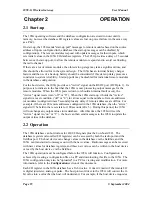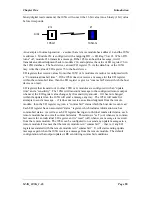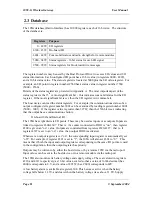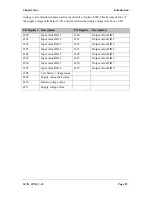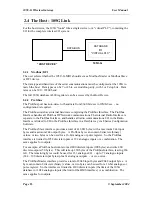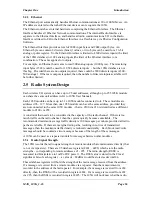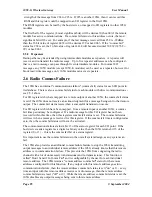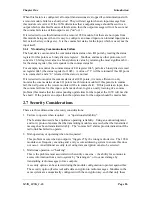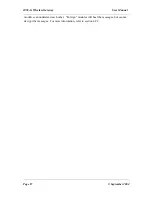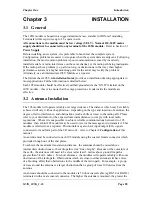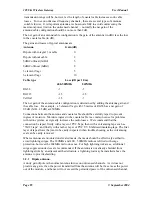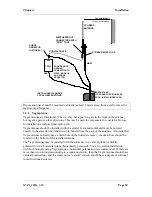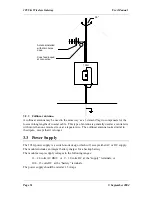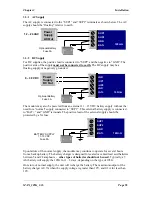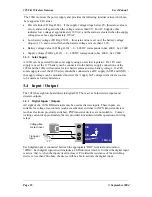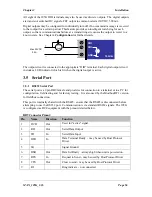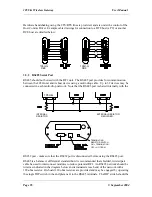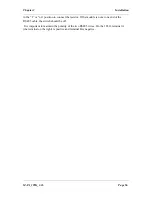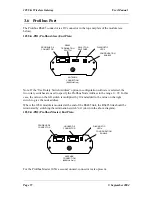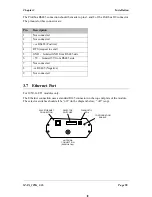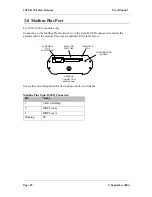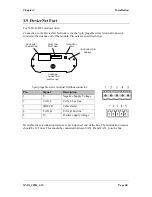
105U-G Wireless Gateway
User Manual
Page 25
© September 2004
strength of the message from #24 to #25 is. If #25 is another 105G, then it can record this
RSSI and this register could be mapped to an I/O register in the first 105G.
The RSSI registers can be read by the host device, or mapped to I/O registers in other 105G
modules.
The first half of the register (8 most significant bits) will be decimal 0 (hex 00) if the remote
module has active communications. If a comms fail status to this address occurs, the most
significant bit will be set. For example, if the last message received from #38 is –99dBm,
then the 16 bit value of register 4438 will be decimal 99 or hex 0063. If the “comms fail”
status for #38 is set, the 16 bit value of register 4438 will become decimal 32,867 (32768 +
99) or hex 8063.
2.5.2
Repeaters
Radio paths may be extended by using intermediate modules as repeaters. A repeater will
receive and re-transmit the radio message. Up to five repeater addresses can be configured -
that is, a radio message can pass through five intermediate modules. For normal I/O
messages, any 105U module (except 105U-K modules) can be used as a repeater, however for
block read/write messages, only 105G modules can act as repeaters.
2.6
Radio Comms Failure
The 105G has an internal "communications failure" (comms fail) status for each I/O point in
its database. There is also a comms fail status for each module with direct communications -
see 2.5.1 above.
For I/O registers which are mapped to a remote output or another 105G, the comms fail status
is set if the 105G does not receive an acknowledgment for a message being sent to that remote
output. The comms fail status resets when a successful transmission occurs.
For I/O registers which have been mapped , from a remote input or another 105G, a comms
fail time period may be configured. If a radio message for this I/O register has not been
received within this time, then this registers comms fail status is set. The comms fail status
will reset when a message is received for this register. If the comms fail time is configured as
zero, then the comms fail status will never be activated.
The communications failure status is bit 15 of the status register for each I/O point. If the
host device reads a register as a digital or binary value, then the 105G returns bit 15 of the
register (0 or 1) - this is the comms fail bit of a status register.
It is important to use the comms fail status in the overall system design, as any system can
fail.
The 105G also provides an additional comms failure feature to stop the 105G transmitting
output messages to an individual remote address if the 105G already knows that this remote
address is in communication failure. This prevents the 105G from congesting the radio
channel with a lot of unnecessary transmissions (and re-transmissions). This function is
called "Don’t Send if In Comm Fail" and is configurable by the user for each individual
remote address. The 105G retains a "remote address comms fail" status for the remote
addresses configured for this function. If any output with this remote address goes into
communications failure, then the remote address comms fail status is set ("on" or 1) - every
time an input with this remote address receives a radio message, then the remote address
comms fail status is reset ("off" or 0). While the remote address comms fail status is set, the
105G disables any output messages being sent to this remote address.









